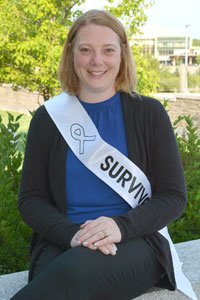Charting a different cancer future through genetic testing
 Amanda White’s life experience with cancer is different than most people’s.
Amanda White’s life experience with cancer is different than most people’s.
To hear her describe it, her cancer journey actually began in 1975 – years before she was even born.
Amanda, sadly, represents the third generation of her family to be treated for a genetically-prevalent type of breast cancer that has always appeared in the left breast and was diagnosed when the family member was relatively young.
Her grandmother was diagnosed in 1975 at age 35 and, because so much less was known about the disease then, her diagnosis came too late for her disease to be effectively treated. She died a year later.
The family’s cancer story continued years later when Amanda’s aunt was diagnosed at age 32. Six months later, it was her mother Pam’s turn. Pam fought the disease valiantly for 14 years, receiving treatment first at MaineGeneral Medical Center’s oncology unit and later at the Harold Alfond Center for Cancer Care (HACCC) when it opened in 2007. She was only 50 years old when she died in 2010.
Two years later, at age 28, Amanda discovered a lump during a breast self-exam and began her own personal experience with the disease.
“I was six months and found a lump while taking a shower. I assumed it was just an enlarged milk duct because I was pregnant; I didn’t know who to ask or talk to,” she recalls. “I brushed it off for a few weeks before a friend encouraged me to get it checked.”
Amanda’s ob/gyn scheduled an ultrasound and, shortly after, a biopsy.
“I got a phone call a week later to meet with the surgeon. It was then I learned I had breast cancer,” she says.
Amanda consulted with Dr. Andrew Hertler, who treated her mother and formerly was medical director of oncology at the HACCC. He recommended that she have both breasts removed because of her strong family history.
Amanda had surgery in Portland, followed by reconstructive surgery, and then chemotherapy treatment for a full year at the cancer center, followed by six weeks of radiation therapy. All of this started two weeks after she gave birth to her daughter Taylor, now 8.
“I was very proactive and could hear my mother’s voice telling me I needed to do something," she says. "She had genetic testing done and while her results were negative, we knew there was a family link. So I decided to have more advanced testing.”
Amanda's comprehensive testing results showed an abnormal link to a gene called Li-Fraumeni syndrome (LFS) – and a natural connection to many other forms of cancer beyond breast cancer.
With the knowledge her genetic testing gave her, Amanda has become a strong proponent of it – for herself, other family members and, most importantly, for Taylor.
“I feel I can now be more aware of the cancer risks in my family and take more precautions with regard to other types of cancers,” Amanda says. “I'd like to have genetic testing done for Taylor when she’s older and can better understand it. I want her to be able to make her own decision.”
In the meantime, Amanda's family is cherishing each day and the blessings it brings. And one of those blessings was being able to serve as one of three cancer survivors chosen as marshals for MaineGeneral's 2020 Day of Hope on Oct. 3
“Thankfully I’ve been cancer free for seven years and I like to think that I’m striving to go further than my mom was able to,” she says. “Life is too short so I live it day by day and enjoy every day with my daughter.”
To listen to Amanda tell her story, watch her video.
To donate greatly needed funds to support Maine people treated for cancer at the HACCC, visit our Day of Hope page.